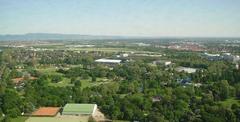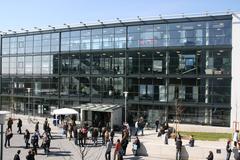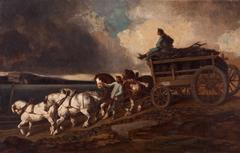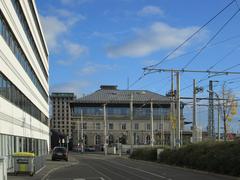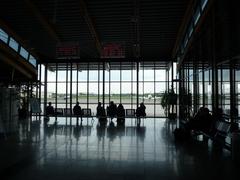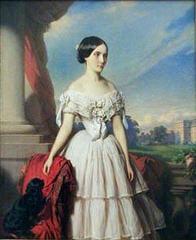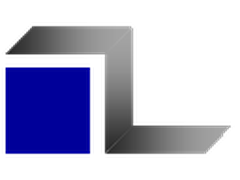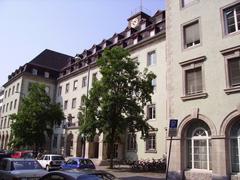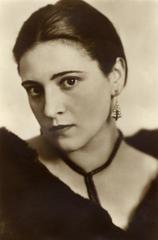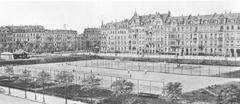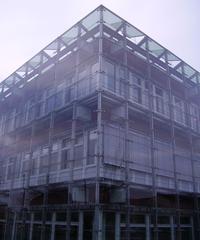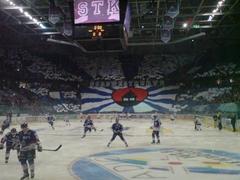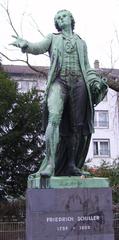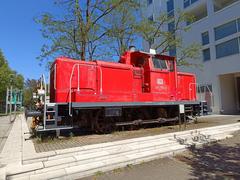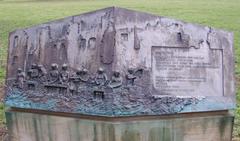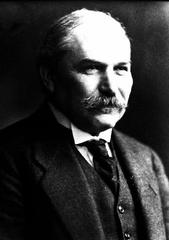
Grosskraftwerk Mannheim: Comprehensive Visiting Hours, Tickets, and Historical Sites Guide
Date: 04/07/2025
Introduction
Grosskraftwerk Mannheim (GKM) is a monumental symbol of Germany’s industrial heritage and energy innovation, located in the vibrant city of Mannheim, Baden-Württemberg. Established in 1921 near the Rhine and Neckar rivers, GKM has evolved over a century from a pioneering coal-fired power plant into a state-of-the-art energy complex that helps power approximately 2.5 million people and provides district heating to around 120,000 households. Its strategic riverside location facilitated coal deliveries and enabled efficient cooling, contributing to decades of operational success (GKM History).
GKM is not only an active contributor to Germany’s energy infrastructure but also a living testament to the nation’s industrial transformation and ongoing transition to sustainability. It features advanced technology—most notably Block 9, commissioned in 2015—which achieves 911 MW output and a 46.4% fuel efficiency rate, exemplifying the blend of tradition and innovation (Implenia).
Though primarily an operational facility, GKM periodically opens its doors to the public for exclusive guided tours and special events. These visits offer rare insights into large-scale energy production, environmental stewardship, and technical innovation. This guide provides detailed information on visiting hours, ticketing, tour booking, accessibility, safety protocols, and tips for making the most of your visit—including how to integrate your GKM experience with Mannheim’s renowned historical and cultural attractions (visit-mannheim.de).
Table of Contents
- Introduction
- Historical Evolution and Industrial Heritage
- Technological Innovation and Energy Efficiency
- Environmental Impact and Sustainability Transition
- Economic and Regional Importance
- Cultural and Educational Value
- Visitor Information
- Location and Transportation
- Nearby Attractions
- Special Events and Photography
- Visitor Tips and Recommendations
- Frequently Asked Questions (FAQ)
- Conclusion
- References
Historical Evolution and Industrial Heritage
Grosskraftwerk Mannheim was founded in 1921 by a consortium of regional energy providers and municipalities. Its location in Mannheim-Neckarau, with immediate access to the Rhine, was chosen for logistical advantages in coal delivery and cooling.
GKM began operations in 1923 with three 12.5 MW units, marking Mannheim’s rise as a regional energy hub. In 1928, it introduced Europe’s first 100-bar high-pressure unit, significantly reducing coal consumption and production costs (GKM History).
During World War II, GKM constructed the “Werk Fritz,” a 32 MW underground plant camouflaged against bombings, ensuring electricity supply during critical periods. Post-war reconstruction and expansion further cemented GKM’s role in the region’s development.
Technological Innovation and Energy Efficiency
The 1950s and 1960s saw substantial growth at GKM. Block 1, launched in 1954, achieved a then-record efficiency of 38.2%. The Voith-Marguerre coupling allowed for the simultaneous generation of railway and standard electricity, establishing a unique partnership with Deutsche Bahn.
Subsequent expansions, including Blocks 2 and 3, increased total capacity to 730 MW and further improved efficiency. District heating was introduced in 1959, initially with heat exchangers and later with combined heat and power (CHP) technology, raising fuel utilization rates to 70% (GKM History).
The commissioning of Block 9 in 2015 was a significant technological leap. With an output of 911 MW and 46.4% efficiency, Block 9 represents the pinnacle of modern hard coal-fired power generation, setting new standards for environmental performance (Implenia).
Environmental Impact and Transition to Sustainability
GKM plays a crucial role in Germany’s Energiewende, the national transition toward renewable energy. Block 9 enables annual CO₂ savings of up to 1.3 million tons compared to older units (GKM Block 9). As Germany moves toward a coal phase-out by 2038, GKM is actively exploring geothermal and river heat pump projects to maintain its role as a primary energy provider for Mannheim and the Rhine-Neckar region (GKM 100 Years).
Economic and Regional Importance
As the largest energy site in Baden-Württemberg, GKM underpins the economic stability and industrial growth of Mannheim and the broader metropolitan area. Its integration with Deutsche Bahn highlights its strategic relevance for transportation infrastructure, and ongoing modernization secures employment and technical expertise in the region (Mannheim Tourism).
Cultural and Educational Value
GKM is a focal point for industrial heritage tourism and educational outreach. Guided tours—especially popular with technical groups, students, and sustainability enthusiasts—offer deep insights into one of Germany’s most advanced energy sites (GKM Company). The story of GKM parallels Mannheim’s own transformation from an industrial powerhouse to a city of innovation and sustainability (World Marketing Diary).
Visitor Information
Visiting Hours and Ticketing
- Guided Tours: GKM organizes guided tours on select dates, typically on weekdays between 9:00 AM and 4:00 PM. Some events may occur in the late afternoon or early evening (e.g., 5:00 PM–8:00 PM).
- Booking: Advance registration is required. Tours can be booked through the official GKM website, Technoseum, or Mannheim tourism office (visit-mannheim.de). Group bookings for educational institutions and professionals are available.
- Tickets: Many tours are free or have a nominal fee. Group sizes are limited (often up to 30 participants) to ensure safety and quality.
Accessibility and Safety
- Minimum Age: 14 years (varies by tour).
- Physical Requirements: Participants should have no significant mobility impairments, fear of heights, or pacemakers, as the tours involve industrial environments and elevated walkways.
- Accessibility: Limited; please notify organizers in advance if accommodations are needed.
- Safety: All visitors must wear closed-toe shoes and provided safety equipment, such as helmets and vests.
Guided Tours and Visitor Experience
GKM’s guided tours offer an immersive experience, taking visitors through:
- Coal Milling Facilities: Learn how raw coal is processed.
- Steam Generation Halls: See the transformation of coal into electricity.
- Flue Gas Cleaning Systems: Understand advanced emission control.
- Control Rooms: Observe real-time plant operations.
Expert guides explain every stage, from fuel delivery to energy distribution, and highlight GKM’s efforts in environmental protection and CHP efficiency.
Location and Transportation
- Address: Plinaustr. 20, 68199 Mannheim, Germany (some sources may reference Kallstadter Straße 1; confirm when booking).
- By Public Transport: Accessible via tram lines 5 and 6 or local buses from Mannheim Hauptbahnhof.
- By Car: Limited on-site parking; public transport is recommended, especially during weekdays (Mannheim public transport).
Nearby Attractions
Enhance your visit by exploring Mannheim’s cultural and historical sites:
- Technoseum: Museum of technology and work, featuring interactive exhibitions (Technoseum).
- Mannheim Palace (Schloss Mannheim): Among Europe’s largest Baroque palaces.
- Wasserturm: Iconic Art Nouveau water tower at Friedrichsplatz.
- Luisenpark: Expansive urban park with gardens, a tea house, and panoramic city views.
- Jesuitenkirche: Notable Baroque church.
- SAP Arena: Venue for concerts and sports events (visit-mannheim.de).
Special Events and Photography
GKM occasionally hosts special events, educational workshops, and open days in partnership with local institutions. Always check the event schedule in advance. Photography is permitted in designated areas but may be restricted in sensitive zones; check permissions with your guide.
Visitor Tips and Recommendations
- Book Early: Tours fill quickly due to limited capacity.
- Arrive on Time: Allow extra time for security and safety briefings.
- Dress Appropriately: Wear sturdy, closed-toe shoes and comfortable clothing.
- Language: Tours are primarily in German. English-language tours may be arranged upon request or with a translator.
- Combine Visits: Plan your day to include other Mannheim attractions for a well-rounded experience.
- Check Events Calendar: Mannheim hosts various festivals and events throughout the year (thetouristchecklist.com).
Frequently Asked Questions (FAQ)
Q: How do I book a guided tour at GKM?
A: Reserve your spot through the GKM website, Technoseum, or Mannheim Tourist Information.
Q: What is the minimum age for tours?
A: Generally, participants must be 14 or older for safety reasons.
Q: Are English-language tours available?
A: Most tours are in German; inquire about English options when booking.
Q: Is the site wheelchair accessible?
A: Accessibility is limited; contact GKM in advance to discuss possible accommodations.
Q: Can I take photographs during the tour?
A: Photography is allowed in specific areas; always confirm with your guide.
Conclusion
Grosskraftwerk Mannheim stands as a testament to Germany’s industrial ingenuity and ongoing commitment to a sustainable energy future. A visit to GKM offers an unparalleled educational experience—allowing you to witness firsthand the intricacies of energy production, environmental stewardship, and technological innovation. Combine your tour with Mannheim’s vibrant historical and cultural scene for a truly memorable itinerary.
Plan ahead, book your tickets in advance, and immerse yourself in the dynamic interplay of tradition and innovation that defines Mannheim and its iconic power station.
Stay updated on tour dates, special events, and exclusive content by following Mannheim tourism channels and considering the Audiala app for guided audio experiences and notifications.
References
- Visiting Grosskraftwerk Mannheim: Hours, Tours, and Historical Insights, 2024
- Grosskraftwerk Mannheim: Visiting Hours, Tickets, and Exploring Mannheim’s Historic Energy Landmark, 2024
- Großkraftwerk Mannheim Visiting Hours, Guided Tours, and Visitor Information, 2024
- Visiting Grosskraftwerk Mannheim: Tours, Tickets, Visiting Hours, and Nearby Mannheim Attractions, 2024
- Implenia: Mannheim Power Station Block 9, 2024
- Mannheim Tourism Official Website, 2024






